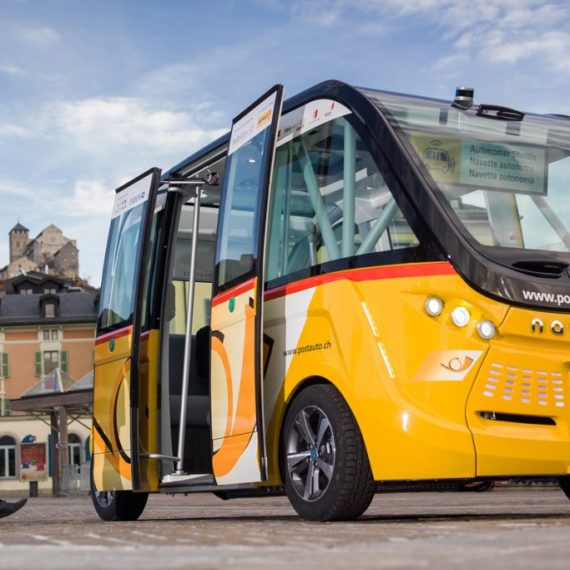In 2015, being one of the ten finalists of the Swisscom Startup Challenge, the startup BestMile was selected as the audience’s darling. CEO Raphaël Gindrat talks about their current projects, the future of fleet management and life in a startup.
Raphaël, one year ago, you were one of the ten finalists of the Swisscom Startup Challenge as well as the winner of the audience award. Fast forward to today in Sion, there are two driverless buses that have integrated your software – how did you manage to do that?
Raphaël: As a startup you have to be able to do a lot with very little resources. It is essential to focus on the right projects. During the past year, we were dedicated to perfectly getting to know our industry to address its challenges in the most relevant way. It was essential for us to find the right partners and opportunity to advance autonomous mobility. We believe our project “SmartShuttle” in collaboration with PostBus in the city center of Sion will provide essential insights into the reality and the challenges of integrating an autonomous fleet of vehicles into urban areas.
In what way has your participation in the Startup Challenge been helpful?
Raphaël: The Startup Challenge happened at a time where it was essential for us to have an objective look back at all the work that had been done in order to decide where we wanted to go. It was the ideal occasion to structure our vision and work. The challenge brought us visibility and confirmed the accuracy of our strategic positioning in the autonomous mobility industry. It also allowed us to build a strong network that is still useful to us today.
 According to you, BestMile works as a “brain”, enabling the control of many autonomous vehicles at the same time. What does that mean in concrete terms?
According to you, BestMile works as a “brain”, enabling the control of many autonomous vehicles at the same time. What does that mean in concrete terms?
Raphaël: Our fleet management platform decides in real-time which mission to send to which vehicle in order to offer the highest quality of service to the passenger in the most efficient way for the operator. It allows the intelligent operation and optimization of autonomous vehicle fleets. Using algorithms, the platform sends optimized missions to the vehicles and seamlessly handles planning, dispatching, routing, and battery charging management. It manages both scheduled trips and on-demand service, and is independent of any vehicle manufacturer, thus allowing customers to remotely manage heterogeneous fleets composed of autonomous vehicles of different types and brands.
BestMile also provides both front-end and back-end interfaces for operators and passengers, such as mobile and web applications.
Our premise is that the future of mobility isn’t in autonomous vehicles themselves, but in what they can offer when they’re operated and managed collectively in an integrated ecosystem.
Where will you be in one year? Where will Switzerland be in the field of fleet management of autonomous vehicles?
Raphaël: We are much more advanced than we ever expected one year ago, it’s difficult to realistically predict where we’re going to be a year from now. The autonomous mobility industry is one of the fastest-growing industries right now which makes the task even harder.
Switzerland is one of the most advanced countries in the world in terms of autonomous mobility today. “SmartShuttle” in Sion (Switzerland) is the first instance in which electric autonomous shuttles are circulating through a city center and servicing the public on a daily basis. We have no doubts that Switzerland will stay one of the leading countries in autonomous mobility.
The current trials in Sion are taking place in pedestrian areas – in areas, where the risks of accidents are comparably low. Is it also your goal to implement your software in vehicles in hectic cities and metropoles or will that ever be possible?
Raphaël: The paths of the autonomous shuttles in Sion cross open roads too, so the shuttles are confronted with regular road-users. Of course, Swiss cities are by far not the most hectic cities in the world but it is a good start. In order to have a fully integrated autonomous transport system that is safe, even in hectic cities, there is the need for a global supervision and management solution. BestMile’s platform will soon take into account not only the driverless vehicles, but also the location and status of other cars / buses. Connected infrastructure will become handy and BestMile will become a central part of the IoT ecosystem.
Many other cities and transport operators have reached out to us following the announcement of the project in Sion to discuss the possibility of using autonomous shuttles combined with our solution to offer a comprehensive autonomous transport system. We are convinced that even before the end of the project in Sion (2 years from now) numerous cities and private sites will be equipped with their own autonomous transport system.
The idea of autonomous vehicles as part of our daily lives often arouses skepticism regarding our personal safety – how can you convince the public of the contrary?
Raphaël: Most car accidents are due to human error. Even if it’s difficult to admit, there is no doubt that autonomous vehicles are safer drivers than we are. In addition, with our platform, a supervisor is always remotely monitoring the vehicles and he can interact with the passengers or intervene in case of emergency.
We’ve only received positive feedback from people who used the shuttles in our different pilot projects. Everyone is thrilled to try them out. Passengers are very curious about the technologies and how the whole system operates. The questions revolve around the same topics: Does it really work without any human operator? How does it detect obstacles? Passengers are impressed like they would be of a magic trick, but they know it is not magic but advanced technology. It is understandable that the public is frightened or skeptical when confronted with something completely new. Once the use of autonomous vehicles is generalized, the public will see for themselves how incredibly convenient autonomous mobility actually is.
How hard/exciting is life of a startup?
Raphaël: The life of a startup is full of unknowns and uncertainties, this is what makes it so challenging and enriching. You have to embrace these uncertainties and turn them into strengths. Everything is about balance, between being realistic and visionary. Most importantly, you have to welcome failure as a valuable lesson and not think of it as the end.

